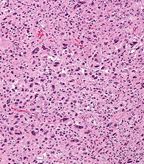ESMO: New Agent, Aldoxorubicin (INNO-206), Shows Activity in Soft-Tissue Sarcoma
Results from a phase Ib/II trial presented at the ESMO 2012 Congress found that a tumor-targeting doxorubicin conjugate, aldoxorubicin (INNO-206), showed activity in relapsed soft-tissue sarcoma patients.
Results from a phase Ib/II trial presented at the European Society for Medical Oncology (ESMO) 2012 Congress found that a tumor-targeting doxorubicin conjugate, aldoxorubicin (formerly INNO-206), showed activity in relapsed soft-tissue sarcoma patients. According to the study, the agent works by attaching itself to an “acid-sensitive linker that binds covalently to cysteine-34 in circulating albumin.”

Intermediate magnification micrograph of a pleomorphic undifferentiated sarcoma, H&E stain; source: Nephron, Wikimedia Commons
The trial, ESMO abstract #1483PD, studied the safety and tumor response of aldoxorubicin in 19 patients, 13 of whom had metastatic soft-tissue sarcoma of various types whose disease had progressed following prior chemotherapy.
Aldoxorubicin was administered every 21 days intravenously at a 350 mg/m2 dose for up to eight cycles. Treatment was continued until toxicity became unacceptable or tumor progression was seen. Response to treatment was monitored every other month.
In the group of patients with soft-tissue sarcoma, five objective partial responses were seen, and seven patients had stable disease (median 6.43 months). One patient had tumor progression after the first evaluation.
“Although the trial data are derived from a small patient group, the fact that clinical benefit was seen in 77% of these patients is noteworthy, particularly given the advanced stage of disease,” said the trial’s principal investigator Sant P. Chawla, MD, FRACP, in a press release. “Further, of the eight evaluable patients who were previously treated with doxorubicin and had either not responded or relapsed, five showed clinical benefit with aldoxorubicin. Among these, three showed prolonged partial responses with greater than 30% tumor shrinkage.”
The trial achieved a cumulative doxorubicin dose equivalent to 2000 mg/m2, more than three times the peak cumulative dose of standard doxorubicin.
During the first cycle, the majority of the 19 patients had grade 3 or 4 neutropenias that were resolved with and without granulocyte colony-stimulating factor treatment prior to the next cycle. No participants experienced nonhematologic grade 3 or 4 events. Using MUGA and cardiac ultrasound, no relevant cardiotoxicity was observed. Two patients died during the first cycle (one from sepsis and one from disease progression); other serious adverse events included mucositis and febrile neutropenia.
The study investigators concluded that aldoxorubicin “is an active drug for the treatment of patients with advanced soft-tissue sarcoma who have failed prior chemotherapy.”
CytRx Corporation, the biopharmaceutical company that conducted the trial, plans to discuss a potential phase III pivotal trial for aldoxorubicin in the treatment of relapsed or refractory soft-tissue sarcoma with the US Food and Drug Administration.
Sarcoma Awareness Month 2023 with Brian Van Tine, MD, PhD
August 1st 2023Brian Van Tine, MD, PhD, speaks about several agents and combination regimens that are currently under investigation in the sarcoma space, and potential next steps in research including immunotherapies and vaccine-based treatments.